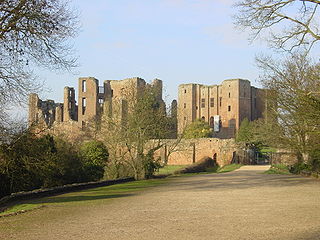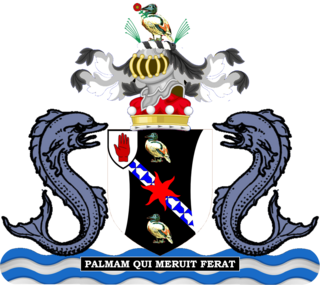Baron Marchamley, of Hawkestone in the County of Salop, is a title in the Peerage of the United Kingdom. It was created in 1908 for the Liberal politician George Whiteley, who had previously represented Stockport and Pudsey in the House of Commons. As of 2014 the title is held by his great-grandson, the fourth Baron, who succeeded his father in 1994.
Viscount Camrose, of Hackwood Park in the County of Hampshire, is a title in the Peerage of the United Kingdom. It was created on 20 January 1941 for the prominent newspaper magnate William Berry, 1st Baron Camrose. He had already been created a Baronet, of Long Cross in the County of Surrey, in the Baronetage of the United Kingdom, on 4 July 1921, and Baron Camrose, of Long Cross in the County of Surrey, on 19 June 1929, also in the Peerage of the United Kingdom. His second son, the third Viscount, disclaimed the peerages in 1995 on succeeding his elder brother. However, he had already been created a life peer as Baron Hartwell, of Peterborough Court in the City of London, on 19 January 1968. On his death in 2001 the life peerage became extinct while he was succeeded in the other titles by his eldest son, the fourth Viscount. The first three Viscounts all headed The Daily Telegraph at one point, the first having purchased it from Harry Levy-Lawson, 1st Viscount Burnham, but in the 1980s they lost control to Conrad Black.

Baron Castlemaine, of Moydrum in the County of Westmeath, is a title in the Peerage of Ireland. It was created in 1812 for William Handcock, with remainder to his younger brother Richard Handcock. Handcock represented Athlone in Parliament and also served as Governor of County Westmeath. In 1822 he was further honoured when he was made Viscount Castlemaine in the Peerage of Ireland, with remainder to the heirs male of his body.
Baron Huntingfield is a title that has been created three times, twice in the Peerage of England and once in the Peerage of Ireland. The first two creations were by writ, but little more is known about them, except that John de Huntingfield, who was created Baron Huntingfield in 1362, married Margery de Welles, daughter of John de Welles, 4th Baron Welles. John was dead by December 1376, when Margery remarried. Both titles probably became extinct or fell into abeyance on the death of their first holders. The third creation, Baron Huntingfield, of Heveningham Hall in the County of Suffolk, was created in the Peerage of Ireland in 1796 for Sir Joshua Vanneck, 3rd Baronet, Member of Parliament for Dunwich. His son, the second Baron, also represented this constituency in the House of Commons. His great-grandson, the fifth Baron, was Conservative Member of Parliament for Eye and Governor of Victoria. As of 2013 the titles are held by the latter's grandson, the seventh Baron, who succeeded his father in 1994.

Baron Grimthorpe, of Grimthorpe in the East Riding of the County of York, is a title in the Peerage of the United Kingdom. It was created on 17 February 1886 for the lawyer and architect Edmund Beckett, 1st Baron Grimthorpe, 5th Baronet Beckett, with remainder to the heirs male of his father. He was succeeded according to the special remainder by his nephew, the second Baron. He had earlier represented Grimsby in Parliament. As of 2014 the titles are held by the latter's great-grandson, the fifth Baron, who succeeded his father in 2003.

Baron Avebury, of Avebury in the County of Wiltshire, is a title in the Peerage of the United Kingdom. It was created 22 January 1900 for the banker, politician and archaeologist Sir John Lubbock, 4th Baronet. He was succeeded by his eldest son, the second Baron. On his death the titles passed to his nephew, the third Baron. He was the son of Hon. Harold Fox Pitt Lubbock, fourth son of the first Baron, who died in 1971. The title then passed to the third Baron's first cousin, the fourth Baron, the son of Hon. Maurice Fox Pitt Lubbock, sixth son of the first Baron. The fourth baron was a Liberal Democrat politician and one of the ninety excepted hereditary peers who remained in the House of Lords after the passing of the House of Lords Act 1999. He was succeeded by his son, the fifth Baron, in 2016.

Baron Kenilworth, of Kenilworth in the County of Warwick, is a title in the Peerage of the United Kingdom. It was created in 1937 for the motor industry magnate Sir John Siddeley. His grandson, the third Baron, was an interior designer and the founder of John Siddeley International Ltd. As of 2010 the title is held by the latter's son, the fourth Baron, who succeeded in 1981.
Baron Kirkwood, of Bearsden in the County of Dunbarton, is a title in the Peerage of the United Kingdom. It was created in 1951 for the Scottish engineer, trade unionist, Independent Labour Party and later Labour politician David Kirkwood. As of 2010 the title is held by his grandson, the third baron, who succeeded his father in 1970.
Baron Wedgwood, of Barlaston in the County of Stafford, is a title in the Peerage of the United Kingdom. It was created in 1942 for the soldier and politician Josiah Wedgwood. He was the great-great-grandson of Josiah Wedgwood, the founder of the Wedgwood pottery dynasty. As of 2014, the title is held by the first Baron's great-grandson, the fifth Baron, who succeeded his cousin in that year.

Baron Wrenbury, of Old Castle, Dallington in the County of Sussex, is a title in the Peerage of the United Kingdom. It was created in 1915 for the barrister and judge Sir Henry Buckley. He served as a Judge of the High Court of Justice and as a Lord Justice of Appeal. As of 2014 the title is held by his great-grandson, the fourth Baron, who succeeded his father in 2014. The Hon. Sir Denys Buckley, younger son of the first Baron, was also a Judge of the High Court of Justice and Lord Justice of Appeal.

Baron Napier of Magdala, in Abyssinia and of Caryngton in the County Palatine of Chester, is a title in the Peerage of the United Kingdom. It was created in 1868 for the military commander Sir Robert Napier, in recognition of his part in the 1868 Expedition to Abyssinia when the town of Magdala was captured. Napier was later Commander-in-Chief in India and Governor of Gibraltar and was made a Field Marshal in 1882. He was succeeded by his eldest son, the second Baron. He served as Aide-de-Camp to his father. On his death the title passed to his younger brother, the third Baron. He was a Colonel in the British Army. He was succeeded by his half-brother, the fourth Baron. He worked for the Indian State Railways. His son, the fifth Baron, was a Brigadier in the Royal Engineers. As of 2010 the title is held by the latter's son, the sixth Baron, who succeeded in 1987.
Baron Strathalmond, of Pumpherston in the County of Midlothian, is a title in the Peerage of the United Kingdom. It was created on 18 February 1955 for the businessman Sir William Fraser. He was chairman of the Anglo-Persian Oil Company from 1941 to 1956. His son, the second Baron, was managing director of the Kuwait Oil Company and a director of BP and later chairman of Govan Shipbuilders. As of 2017 the title is held by the latter's son, the third Baron, who succeeded in 1976.
Baron Vestey, of Kingswood in the County of Surrey, is a title in the Peerage of the United Kingdom. It was created in 1922 for the shipping magnate Sir William Vestey, 1st Baronet. He was the co-founder of the Blue Star Line. Vestey had already been created a baronet, of Bessémer House in the Metropolitan Borough of Camberwell, in 1913. As of 2018, the titles are held by his great-grandson, the third Baron, who succeeded his grandfather in 1954. He is the eldest son of the Hon. William Vestey, only son of the second Baron. Lord Vestey served as Master of the Horse from 1999 to 2018.
There have been several hereditary and life peerages created for persons with the surname Morris, all in the Peerage of the United Kingdom.

Baron Brain, of Eynsham in the County of Oxford, is a title in the Peerage of the United Kingdom. It was created on 26 January 1962 for the physician and neurologist Sir Russell Brain, 1st Baronet. He had already been created a Baronet, of Reading in the County of Berkshire, on 29 June 1954. As of 2014 the titles are held by his youngest son, the third Baron, who succeeded in that year. He is a retired physician and a former Professor of Medicine at McMaster University, Canada.
Baron Trefgarne, of Cleddau in the County of Pembroke, is a title in the Peerage of the United Kingdom. It was created in 1947 for the barrister, journalist and politician, George Garro-Jones. In 1954 he assumed by deed poll the surname of Trefgarne in lieu of his patronymic. As of 2016 the title is held by his son, the second Baron, who succeeded in 1960. He served in junior ministerial positions in the Conservative administrations of Margaret Thatcher and is now one of the ninety elected hereditary peers that remain in the House of Lords after the passing of the House of Lords Act 1999.
Baron Cawley, of Prestwich in the County Palatine of Lancaster, is a title in the Peerage of the United Kingdom. It was created in 1918 for the Liberal politician Sir Frederick Cawley, 1st Baronet. He had previously represented Prestwich in the House of Commons and served as Chancellor of the Duchy of Lancaster from 1916 to 1918. Before his elevation to the peerage, Cawley had been created a baronet, of Prestwich in the County Palatine of Lancaster, in the Baronetage of the United Kingdom, in 1906. His grandson, the third Baron, notably served as Deputy Chairman of Committees in the House of Lords from 1958 to 1967. As of 2011 the titles are held by the latter's eldest son, the fourth Baron, who succeeded in 2001.

Baron Remnant, of Wenhaston in the County of Suffolk, is a title in the Peerage of the United Kingdom. It was created on 26 June 1928 for the Conservative politician Sir James Remnant, 1st Baronet, who had previously represented Holborn in the House of Commons. He had already been created a Baronet, of Wenhaston in the County of Suffolk, on 14 July 1917. As of 2017 the titles are held by his grandson, the third Baron, who succeeded his father in 1967.

Baron Robertson of Oakridge, of Oakridge in the County of Gloucester, is a title in the Peerage of the United Kingdom. It was created on 29 June 1961 for the military commander Sir Brian Robertson, 2nd Baronet. He had previously served as Military Governor of the British Zone in occupied Germany from 1947 to 1949. The Robertson Baronetcy, of Welbourn in the County of Lincoln, was created in the Baronetage of the United Kingdom on 4 October 1919 for his father, Field Marshal Sir William Robertson, Chief of the Imperial General Staff from 1915 to 1918. As of 2014 the titles are held by the first Baron's grandson, the third Baron, who succeeded his father in 2009.
Colin Strang, 2nd Baron Strang was a British Professor of Philosophy and hereditary peer.







